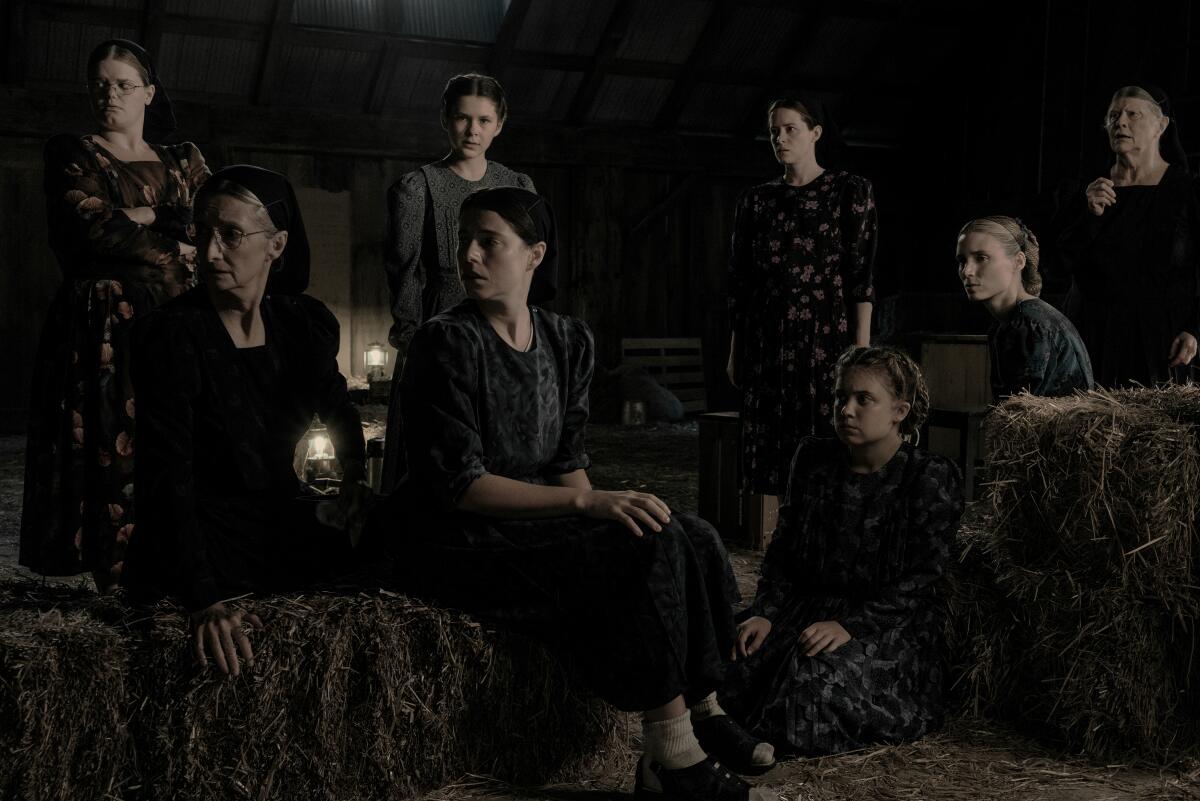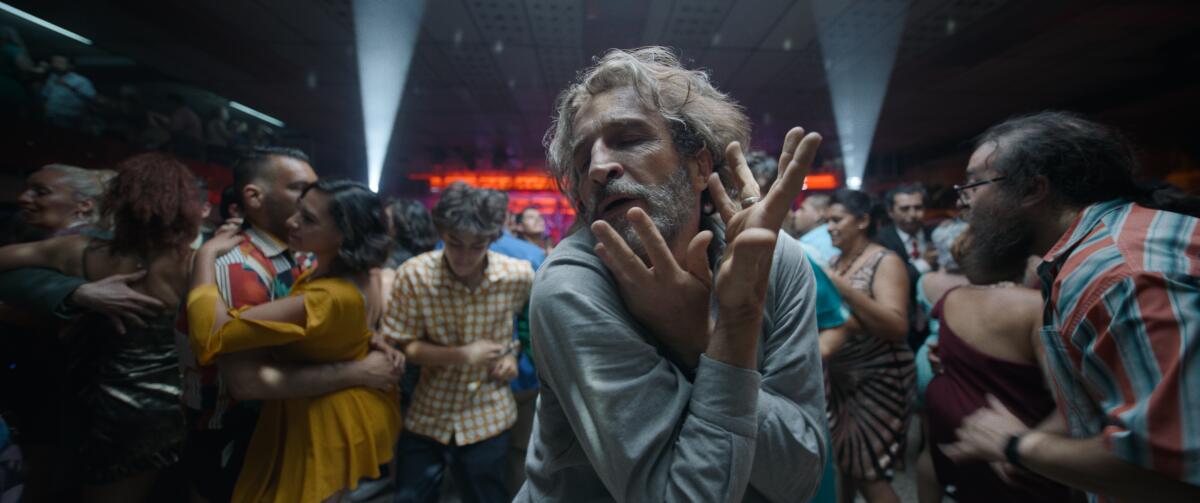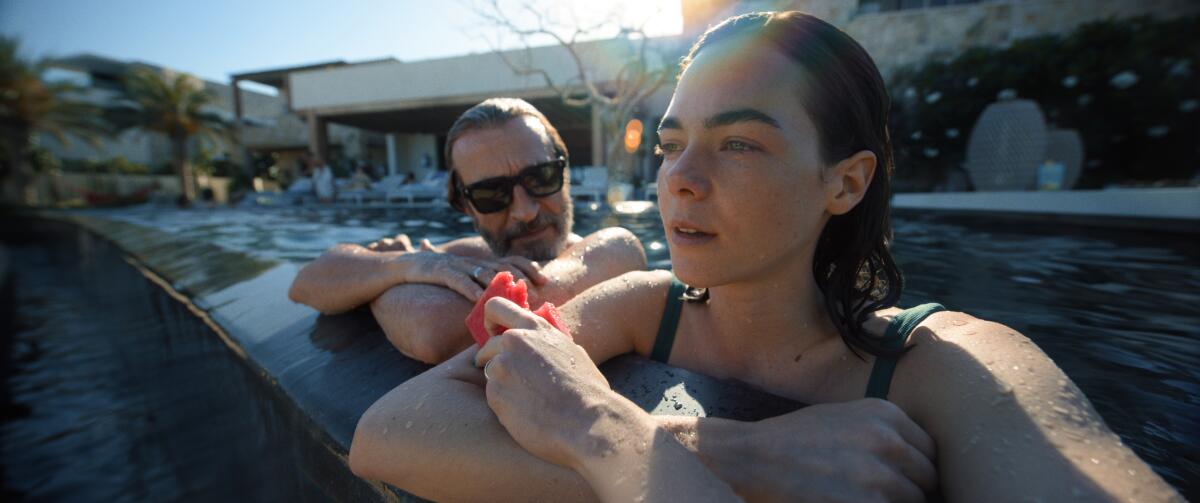A splendid ‘Women Talking’ and indulgent ‘Bardo’ get Telluride arguing from the start

- Share via
TELLURIDE, Colo. — Maybe chalk it up to altitude sickness, but I’m having trouble imagining a more whiplash-inducing double bill than Sarah Polley’s “Women Talking” and Alejandro G. Iñárritu’s “Bardo, False Chronicle of a Handful of Truths,” two of the first movies to screen at this year’s Telluride Film Festival. One lasts a taut 104 minutes; the other runs nearly twice as long. One has a collective focus, burrowing into the anguished deliberations of several women and girls who have endured grievous sexual abuse; the other is a man’s solo artistic journey, an expansive contemplation of his career, his family and his own considerable ego. One makes a virtue of economy; the other happily submits to excess. One, I think, is pretty outstanding; the other I could sometimes barely stand.
Of such furious contrasts and extremes, of course, is any worthwhile film festival made. Telluride, now in its 49th year, prides itself on the excellence of its rigorously curated program, but its organizers — led by the festival’s director, Julie Huntsinger — also know the value of a wide-ranging selection and of a risky title that can set off a heated argument or two. Not that you typically see people coming to verbal blows in the streets and makeshift screening rooms of this small Colorado town, where attendees are famously (if perhaps a bit dutifully) prone to high spirits, grateful for the abundance of interesting movies and gorgeous mountain scenery. Everyone, for the most part, is happy to be here. Good taste may not always reign, but civility generally does.
And sometimes, the movie itself is the argument. “Women Talking,” the justly anticipated fourth feature directed by the Canadian-born actor and filmmaker Polley (after “Away From Her,” “Take This Waltz” and “Stories We Tell”), takes the form of a feature-length debate. Adapted from Miriam Toews’ 2018 novel about a fictional Mennonite community, the movie, which will be released Dec. 2 by United Artists, unfolds almost entirely in the hayloft of a barn where several women and girls have gathered to decide their fates, as well as the fates of the other women and girls in their isolated colony. They must decide whether to carry on with life as normal, stay and do battle with a common enemy, or set out on their own, leaving behind the only home they’ve ever known.
The tragedy that sets this furious clash of wills in motion — a repeated, ritualized campaign of sexual assault by the men in their community — is never explicitly shown, though we see the aftermath in discreet, searing shots of bruised legs and bloodied sheets. It’s enough. Polley has no interest in exploiting the male violence that has been inflicted on her characters, and she trusts her superb actors — they include Frances McDormand, Claire Foy, Jessie Buckley and Rooney Mara — to subtly embody the horrors of the past as their characters grapple with the future. Nor does Polley lean exclusively on realism in a movie that deliberately hovers between drama and parable, the materially concrete and the spiritually abstract, and whose stark austerity sometimes gives way to bursts of salty wit and cathartic laughter.

And so, as sharply honed and concentrated as it is, “Women Talking” has a remarkable formal and conceptual fluidity. The cinematographer, Luc Montpellier, employs a palette that’s muted to the point of monochrome; it’s a deliberately unlovely look — a reflection of an ugly world — that makes it all the more remarkable when moments of color and beauty steal into the frame. The setting is contemporary (there’s a reference to antibiotics and a brief scene with an automobile), but this farming community, with its horses, wagons and agrarian garb, could be situated anywhere and anytime. None of the women can read or write, but they have the battle-hardened eloquence of seasoned verbal pugilists. (Ben Whishaw plays a sensitive male schoolteacher entrusted to take the minutes of their meeting.) Their vigorous back-and-forth, with its emphasis on accountability, protection and liberation, has the resonance of a #MeToo debate; it also confronts an issue — forgiveness — that doesn’t always or even often figure into those debates.
As the women (the excellent Judith Ivey, Liv McNeil, Sheila McCarthy, Michelle McLeod and Kate Hallett round out the cast) grapple with their God-given imperative to forgive their attackers, “Women Talking” gathers extraordinary emotional force, and also something more: genuine spiritual weight. Polley has made an angry, compassionate parable of Christian belief and female empowerment — two forces, often thought to be irreconcilable, that are shown here to be intrinsically bound. She’s also made a movie that, with its acutely sensitive child performances and its deft evocation of unspeakable trauma, seems undeniably informed by her own remarkable but not untroubled history growing up in front of the camera.
Some of that early history was referenced in a special festival tribute that Polley received before “Women Talking’s” first screening Friday night. But the focus was primarily on her later work as a director, especially “Stories We Tell,” the splendid documentary feature she brought here in 2013.
She isn’t the only Telluride veteran who’s been invited back this year. The acclaimed Belgian brothers Jean-Pierre and Luc Dardenne, previously here with “L’Enfant” (2005), “The Kid With a Bike” (2011) and “Two Days, One Night” (2014), have returned with their latest Cannes prize-winner, “Tori and Lokita.” One of the festival’s more hotly awaited titles is the Venice Film Festival-premiered, Cate Blanchett-starring drama “Tár,” the first feature in 16 years from Todd Field, who was previously here in 2006 with “Little Children.”
As it happens, that was also the year that Iñárritu came to Telluride with “Babel”; he’s been back several times since, with “Biutiful” (2010), “Birdman” (2014) and now the elephantine epic tragicomedy that is “Bardo.”

“Bardo” is a movie of several firsts. It marks Iñárritu’s first return to Mexican filmmaking since his much-admired 2001 debut, “Amores Perros,” and also his first time working with the gifted cinematographer Darius Khondji. It’s his first picture conceived along the lines of a semiautobiographical fantasia, with obvious nods to the cracked self-portraiture of Federico Fellini’s “8½” and Bob Fosse’s “All That Jazz,” plus a wealth of wandering-in-the-desert imagery that evokes Terrence Malick’s own childhood epic, “The Tree of Life.” And it’s his first movie, and maybe anyone’s first movie, to begin with the spectacle of a newborn baby declaring the world “too f— up” and being promptly stuffed back into his mother’s womb.
And finally, it marks Iñárritu’s first time working with Netflix, whose reputation for bankrolling wild passion projects surely accounts for how this nearly three-hour auteur indulgence came to exist in such sprawling, untrammeled form. I’m not really criticizing; I’m describing. Iñárritu, who won back-to-back directing Oscars for “Birdman” and “The Revenant,” may have nothing left to prove where the movie industry is concerned, but he is hardly unaware of his reputation in some circles as an arrogant showman, a filmmaker who flings the camera around with empty, pummeling virtuosity. He’s trolling those critics more than a little with “Bardo,” even as he gestures at trolling, or at least examining, himself.
Iñárritu’s fictionalized alter ego is a journalist turned documentary filmmaker named Silverio (a very good Daniel Giménez Cacho, “Zama”) who finds himself back in Mexico years after having moved away to Los Angeles. “Bardo” tells the story of a long-overdue homecoming, and as it slips surreally from one episode to the next, borne aloft by Khondji’s beautifully orchestrated long takes, the specters of the past keep intruding. Some of these ghosts — a bloody scene from the Mexican-American War, a confrontation with the 16th century conquistador Hernán Cortés atop a pile of corpses that reminded me of Vasily Vereshchagin’s painting “The Apotheosis of War” — are drawn from distant history. But others speak more directly to Silverio’s (and Iñárritu’s) experience as an artist whose work has earned no shortage of recognition, plus accusations of being a privileged, hypocritical sellout.
Is Silverio guilty of exploiting the undocumented immigrants who appeared in one of his documentaries? (And does this question also haunt Iñárritu after his 2017 virtual-reality piece “Carne y Arena,” which simulated the harrowing experience of a Mexico-U.S. migrant crossing?) Does Silverio, as a man who’s left behind one homeland for another, deserve to feel any kinship with those who’ve endured an incalculably harder, more arduous journey? These are not uninteresting questions, but Iñárritu, rather than answering them or leaving them provocatively unanswered (either one would be fine), does what he seems to do with most of his stories and ideas nowadays: He flings them around, roughs them up and rearranges them into an imposing, finally insufferable monument to his own awesomeness.
The resulting cinematic dreamscape feels suitably oneiric (a word that pops up in the movie itself), if also more than a little onanistic. “Bardo,” which will open in U.S. theaters Nov. 4 before arriving on Netflix on Dec. 16, is very far from a masterpiece, but no one would deny that it’s Iñárritu’s mastur-piece. He has built it, but beyond Telluride, will anyone come?
More to Read
Only good movies
Get the Indie Focus newsletter, Mark Olsen's weekly guide to the world of cinema.
You may occasionally receive promotional content from the Los Angeles Times.











